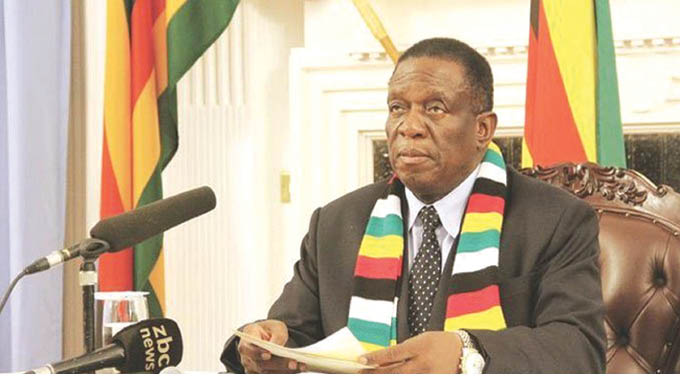
The Sunday News

Harare Bureau
PRESIDENT Emmerson Mnangagwa has commended the European Union (EU) for removing the bulk of sanctions it imposed on Zimbabwe and engaging in progressive dialogue.
The 28-member bloc imposed sanctions on Harare in 2002 but has been progressively reviewing the embargo in recognition of reforms being undertaken by the Government.
Sanctions that remain include travel bans on the late former President Robert Mugabe, his widow Mrs Grace Mugabe, three other officials — Vice President Dr Constantino Chiwenga, Gen Philip Valerio Sibanda (Commander Zimbabwe Defence Forces — and an arms embargo.
The trade embargo was lifted, allowing economic cooperation between the parties. Addressing people gathered at the National Sports Stadium to mark the Southern Africa Development Community (Sadc)-initiated Anti-sanctions Solidarity Day, President Mnangagwa praised the EU for constantly reviewing the measures.
“Allow me to acknowledge and commend the European Union for taking some initial, positive steps towards responding to our offer for dialogue and friendship.
“The EU has begun progressively removing the sanctions that it imposed on us, thereby allowing us to access some development assistance under the European Development Fund.”
President Mnangagwa said the formal dialogue process that has been opened between Harare and Brussels will yield positive results.
“Complementing these practical actions is an ongoing political dialogue to strengthen our bilateral cooperation.”
He, however, called on Washington to immediately and unconditionally remove the sanctions. In an interview last week, EU Ambassador Zimbabwe Mr Timo Olkkonen said only a few “restrictive measures” remain against Harare.
“The EU does not have sanctions against Zimbabwe. The EU’s restrictive measures comprise of a travel ban, an asset freeze against two individuals — the former Presidential couple, Robert and Grace Mugabe. A further three individuals are also on the list, but measures against them are suspended and not actively in force,” he said.
“There is also a prohibition for European companies and individuals to conduct business with one entity, Zimbabwe Defence Industries. There is also an arms embargo. In order for the restrictive measures to be lifted, there should be demonstration that the conditions that lead to their imposition have substantially changed.”
Ambassador Olkkonen said EU’s dialogue with Government is progressing well.
“We are in dialogue with the Government, encouraging it to move ahead with its own reform agenda. Processes with reforms and respect of human rights and democratic principles are conducive for overall EU-Zimbabwe relations.”
He said the remaining EU measures do not restrict any foreign direct investment from Europe or access to the EU markets. Harare contends it had no quarrel with the EU as it was at loggerheads with the UK over the land reform programme.
Spokesperson for the British Embassy in Harare Ms Kate Chambers on Friday told our Harare Bureau:
“The current EU measures, which include an arms embargo and active measures against the late former President Mugabe, his wife Grace Mugabe and the company Zimbabwe Defence Industries, are specifically targeted to do no damage to the wider economy or the people of Zimbabwe and are an appropriate response to the political violence we have seen since 2000.”
But Sadc insists that the sanctions are adversely weighing on Zimbabwe’s economy and, by extension, the region.
Over the years, the EU has reduced the number of officials on sanctions from the initial list of 200 that were placed under the measures first imposed in 2002.
Attempts to get a comment from the US embassy were fruitless as they referred our Harare Bureau to a statement published earlier last week.
Meanwhile, the push to remove sanctions imposed on Zimbabwe by the United States of America and the European Union (EU) is gaining traction after the African Union (AU), China and Sadc diplomats around the world lent their voice for the embargo to be lifted.
AU Commission chairperson Mr Moussa Faki on Friday added diplomatic heft to Sadc’s efforts by calling for the “immediate removal” of the sanctions.
In addition to setting aside 25 October the day to protest against the embargo, Sadc also resolved at the 39th Ordinary Summit of the Heads of State and Government in Tanzania in August to escalate the issue with the continental body.
Information, Publicity and Broadcasting Services Permanent Secretary Mr Nick Mangwana said the momentum that has been generated by the ongoing anti-sanctions crusade was huge.
“The momentum is huge,” he said.
“Here we have 16 countries shouting together and standing with us. We also had (South) Korea standing with us. The surprise for me is that we also had Japan supporting us. They were even prepared to give a solidarity message during the event. ”
Japan’s support as a Group of Seven (G7) member, Mr Mangwana also added, was invaluable.
“To have a G7 country supporting us is just great. In terms of Japan, it is the re-engagement agenda that has made breakthroughs because when we did the programme, the Japanese wanted to give a solidarity message.”
First Secretary at the Embassy of Japan in Zimbabwe Mr Yoichiro Takahashi told our Harare Bureau that they would issue a statement.
“What is important is that Japan has no sanctions against Zimbabwe. We are going to issue (a statement) when the Deputy Ambassador (Mr Kenichi Kasahara) is back in the office,” he said.
Sadc’s Anti-Sanctions Solidarity Day, Mr Mangwana said, had inserted the subject of sanctions in the global domain.
Mr Mangwana added: “I have heard some people saying on the 26th (of October) the sanctions will remain. That is not the idea: the idea is the conversation, and you saw how effective this has been.
“Those who have imposed sanctions on us are fighting back, it means that they heard the noise. Whether you are fighting back, whether you are refusing or a denialist, what matters is that you are talking about it.



